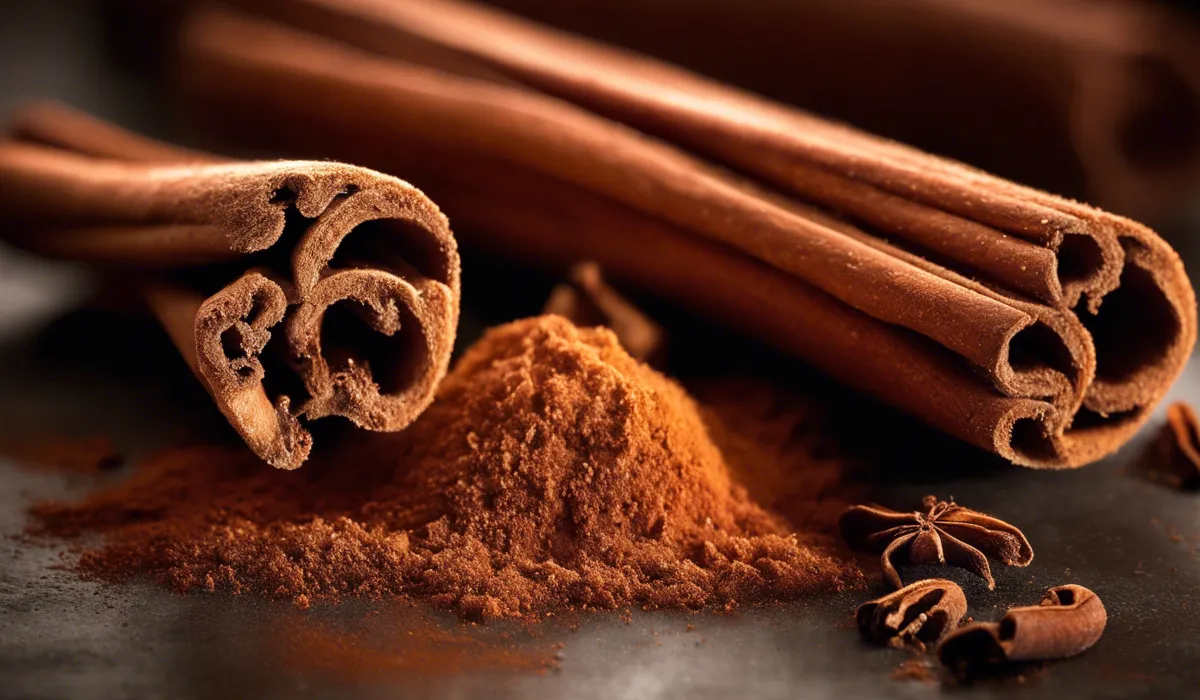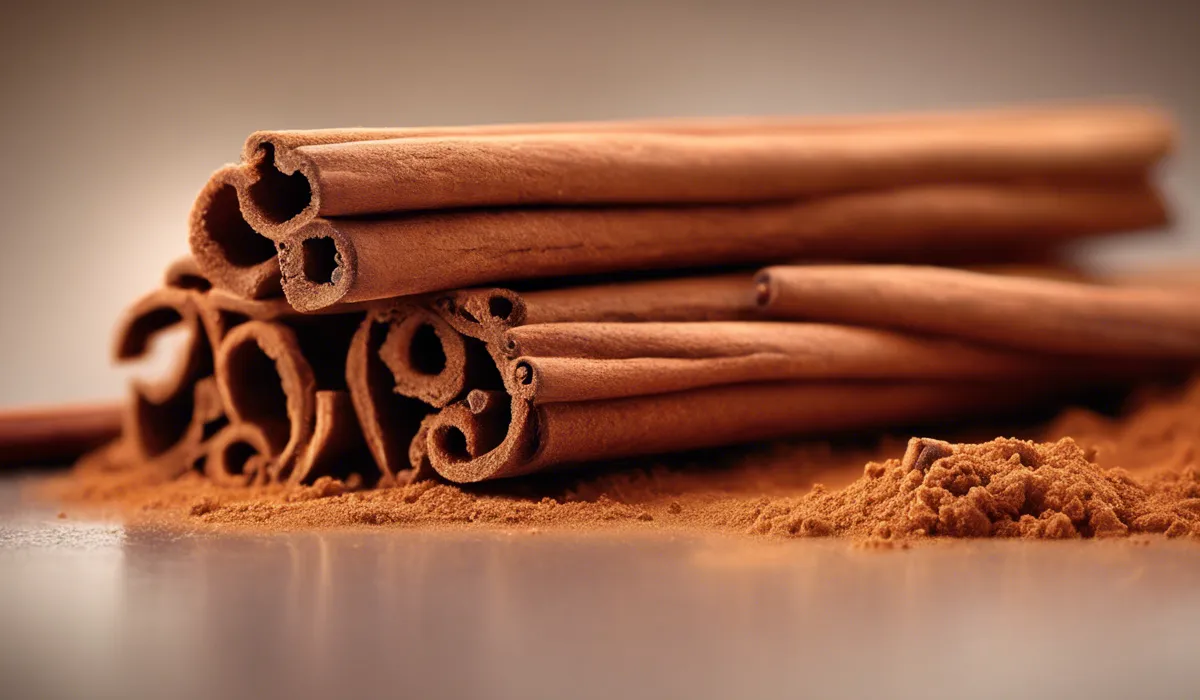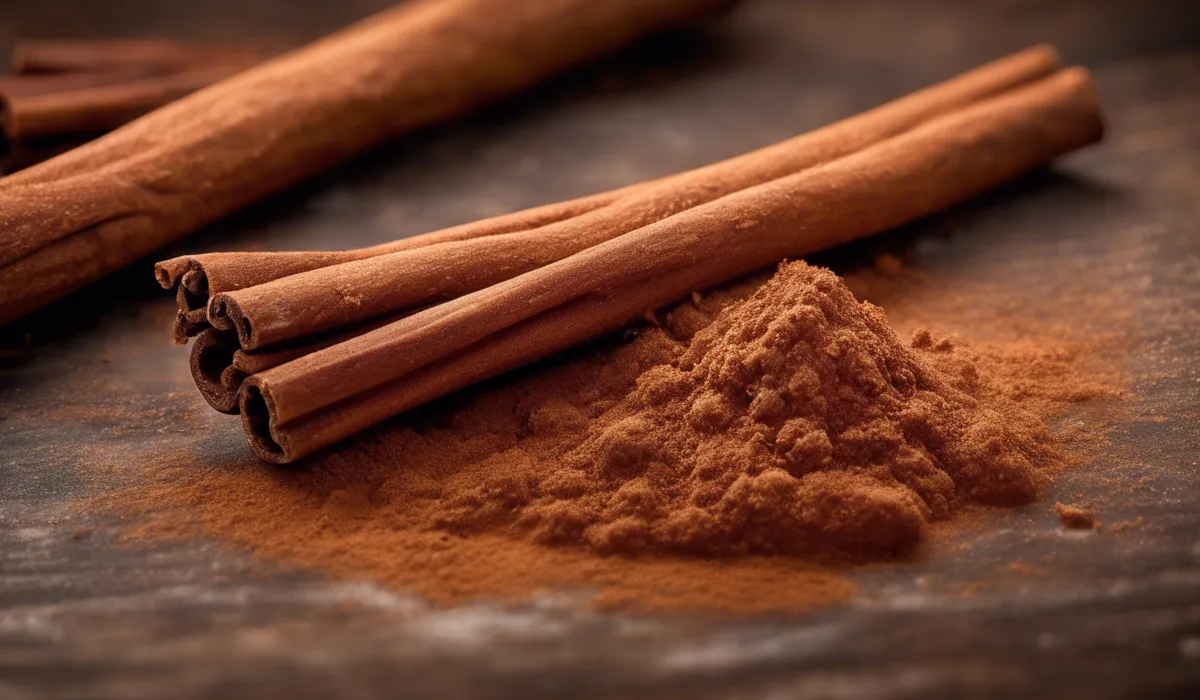Cinnamon can help prevent mold growth due to its antifungal properties. Applying cinnamon oil or powder to areas prone to mold can create an inhospitable environment for mold spores.
However, it is not a complete solution for existing heavy mold infestations.
Exploring the Antifungal Properties of Cinnamon

Cinnamon’s Historical Use as a Preservative
Cinnamon, a spice that comes from the bark of trees in the Cinnamomum family, has a rich history. People have used it for thousands of years not only for its flavor but for preservation.
This spice was a valuable trade commodity between ancient nations. Its ability to keep food fresh made it incredibly sought after in times before refrigeration.
By adding cinnamon to their food, our ancestors could stop the growth of unwanted bacteria and keep their meals safe to eat for longer periods.
Active Compounds with Antifungal Action
Cinnamon owes its antifungal properties to specific compounds within it. The most notable of these is cinnamaldehyde, which gives cinnamon its distinct smell and flavor.
Cinnamaldehyde has been shown to attack and disrupt the cell membranes of fungal organisms.
This damage inhibits the growth and reproduction of the fungi, making cinnamon an effective weapon against mold.
Scientific Studies Supporting Cinnamon’s Effectiveness
Research has backed up the antifungal claims of cinnamon. Studies show that cinnamon oil can stop the growth of various mold strains.
Notably, one study found that cinnamon oil was effective in reducing mold on bread, which is a common problem in many households.
This type of evidence suggests that cinnamon can be a valuable tool in the fight against mold in our homes and food supply.
Comparison with Other Antifungal Agents
When compared to other antifungal agents, cinnamon holds its ground. It is natural and non-toxic, unlike some synthetic options that can contain harmful chemicals.
Other natural alternatives, like vinegar or essential oils from plants like tea tree, also have antifungal properties.
However, cinnamon’s pleasant aroma and flavor, coupled with its preservative qualities, make it a unique and multifaceted option.
Practical Applications of Cinnamon in Preventing Mold

Using Cinnamon in the Home
In the home, cinnamon can help prevent mold on food and in damp areas. Sprinkling cinnamon powder on fruits can keep them fresh for longer.
For non-food surfaces, a homemade spray can be made by mixing cinnamon oil with water. This solution can be applied to areas like bathroom corners and window sills where mold commonly appears.
Cinnamon in Agriculture and Food Preservation
In agriculture, farmers use cinnamon to protect crops from fungal diseases. A cinnamon solution can be sprayed on plants to prevent mold growth without the use of harmful pesticides.
In food preservation, cinnamon is added to packaging to extend shelf life.
This practice takes advantage of its natural antifungal properties to keep products safe and fresh.
Creating Cinnamon-Based Solutions for Mold Prevention
Creating a cinnamon-based solution is simple. Mix a few drops of cinnamon essential oil with water and pour it into a spray bottle.
This mixture can be sprayed on surfaces vulnerable to mold. For added strength, you can combine cinnamon oil with other antifungal oils like clove or eucalyptus.
Incorporating Cinnamon into Everyday Life
Using cinnamon doesn’t have to be limited to mold prevention. Incorporate it into your daily life by adding it to your meals or making a refreshing cinnamon tea.
These habits can help you enjoy the health benefits of cinnamon while keeping your home smelling fresh.
Effectiveness in Different Environmental Conditions
While cinnamon is effective in many environments, its effectiveness can vary. It works best in dry conditions where it can absorb moisture that mold needs to grow.
In very humid environments, more frequent application may be necessary to maintain its antifungal action.
Limitations and Safety Concerns

Limitations of Cinnamon’s Mold-Preventing Capabilities
Cinnamon is helpful in preventing mold, but it’s not a cure-all. It is less effective against existing heavy mold infestations which may require professional treatment.
Cinnamon should be part of a broader mold prevention strategy that includes humidity control and proper ventilation.
Risks of Overuse or Incorrect Use of Cinnamon
While cinnamon is generally safe, overuse or incorrect use can pose risks. Pure cinnamon oil is potent and can irritate the skin, so it should always be diluted before use.
Ingesting large amounts of cinnamon is not recommended as it can lead to health issues like liver damage over time.
Sustainability of Cinnamon as a Mold Inhibitor
Using cinnamon as a mold inhibitor is sustainable when sourced responsibly. It is a renewable resource, but overharvesting can lead to environmental concerns.
It is important to choose cinnamon products from companies that practice sustainable farming.
Guidelines for Safe Use of Cinnamon
When using cinnamon to prevent mold, always follow safety guidelines. Dilute cinnamon oil adequately, wear gloves when handling it in concentrated forms, and keep it away from children and pets.
Never apply cinnamon oil directly to the skin without dilution, and if you’re using it in food, use culinary-grade cinnamon.
FAQs About Cinnamon Preventing Mold
Can cinnamon prevent mold growth?
Yes, cinnamon can help prevent mold growth due to its antifungal properties.
Is cinnamon effective against all types of mold?
Cinnamon oil or powder can create an inhospitable environment for mold spores, but it may not be effective against all types of mold.
How do you use cinnamon to prevent mold?
Applying cinnamon oil or powder to areas prone to mold can help deter mold growth.
Can cinnamon eliminate existing heavy mold infestations?
No, cinnamon is not a complete solution for existing heavy mold infestations and should not replace professional mold remediation.
Is cinnamon a safe alternative to chemical mold inhibitors?
Cinnamon is a natural alternative to chemical mold inhibitors, but its safety and effectiveness can vary depending on the application and environment.
Final Thoughts
Cinnamon’s antifungal properties can help deter mold growth, making it useful for treating areas susceptible to mold.
Applying cinnamon oil or powder can create an environment that is less favorable for mold spores. However, it should not be relied upon as the sole remedy for severe mold infestations, which may require more comprehensive measures.
